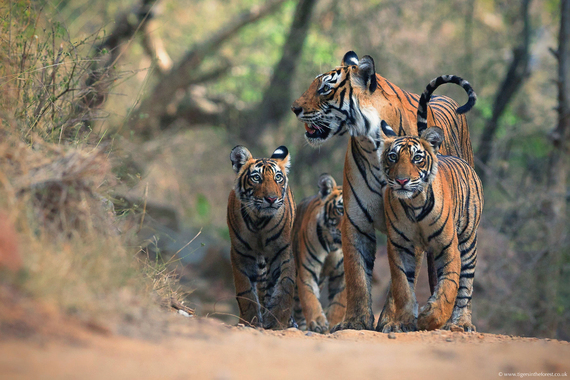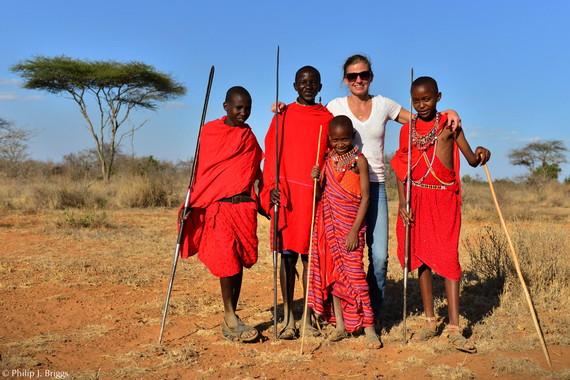
We focus on saving cats for a slew of reasons -- mainly, because they need saving. Numbers for some species are teetering at shockingly low levels -- experiencing drastic, unnatural declines. Fewer than 3,200 tigers remain in the wild in just eight countries in Asia. When I started in this field 15 years ago, tigers were known to be in 13. People are killing tigers because every piece of them from their skins, to bones, to eyeballs to even their anus -- yes, even that, is sold. One of the most majestic creatures we have ever known is being eaten to extinction, bit by bit.
Lions, ranging across Africa with one small population remaining in India, are recognized the world over as a symbol of wild Africa seen in open savannas in prides of up to 30 individuals, they seem abundant, cubs abound, confident in their place in the pyramid, secure. But looks are deceiving; recent estimates are chilling and the real story is they are being killed due to conflict with people and livestock. They are legally but unsustainably hunted for sport, and now the illegal demand for their bones is on the rise. Once numbering more than 200,000 just over 100 years ago, best estimates put their entire population across Africa at fewer than 30,000. Our recent survey efforts revealed that fewer than 250 lions remain in West Africa alone. We are faced with the difficult debate of whether resources and political support can be garnered to save this sinking ship, or whether we turn our life rafts around and focus on other places where lions have a fighting chance.
We protect cats, especially the largest, because they are top predators. Their presence indicates healthy landscapes and functioning ecosystems. They require vast tracts of land. The ranges of the largest seven cat species cover almost a third of the entire terrestrial landscape. They are stunning. They generate tourism revenue. Their presence can even help deliver economic benefits to local communities living in these wild areas -- some of the most marginalized people on the planet. They are part of our human makeup, inspiring myths and legends, art and religion. They remind us we're human.
By ensuring big cats remain on this planet -- we preserve forests, watersheds (in turn carbon sequestration), all living things who share those places, including people -- we may be preserving ourselves. It was Marjorie Stoneman Douglas who said, "Saving the tiger is a test. If we pass, we get to keep the planet." I believe she's right.
It sounds pretty glum. But there's no way I could live 'Big Cat Week' every week for the past decade or for the unforeseeable future if I didn't believe that we could stem the tide, that it's not too late, that we can turn this sad story around. This year alone, I traveled to India, Indonesia, Kenya, Brazil and South Africa, spending time with Panthera's field teams, and our many partners like local governments and NGOs.
What I can tell you is this -- there is a growing army of foot soldiers doing incredible, brave, smart things to save these species. Motivated and pride-filled park guards who are angry about their wildlife being poached, young foreign national researchers, scientists and activists who are hungry and determined to save wildlife. We're making advancements, whether through Panthera's technological progress to outsmart poachers or our work with local people who no longer kill snow leopards as a means to protect their livestock because we're delivering vaccinations (almost 100,000 to date) to save them from disease, a far more deadly threat than the snow leopard itself.
We've got a steep road, and challenges that often block the horizon. But we couldn't do it alone, and we don't. And nor should anyone who is on the front lines saving big cats. They aren't just saving their own country's wildlife -- they're saving yours and mine and the world's wildlife. Solutions exist and there are people out there enacting them, fighting and negotiating every day for the support needed to make an impact, to save these species. I hope this is a message that can come through during this week, a potential megaphone for the big cats, that can shine a light on those who live and breathe Big Cat Week every single day.
Andrea Heydlauff is the Senior Vice President of Panthera, a global big cat conservation organization dedicated to saving the worlds 38 species of wild cats.
Follow her on Twitter @aheydlauff

source
No comments:
Post a Comment